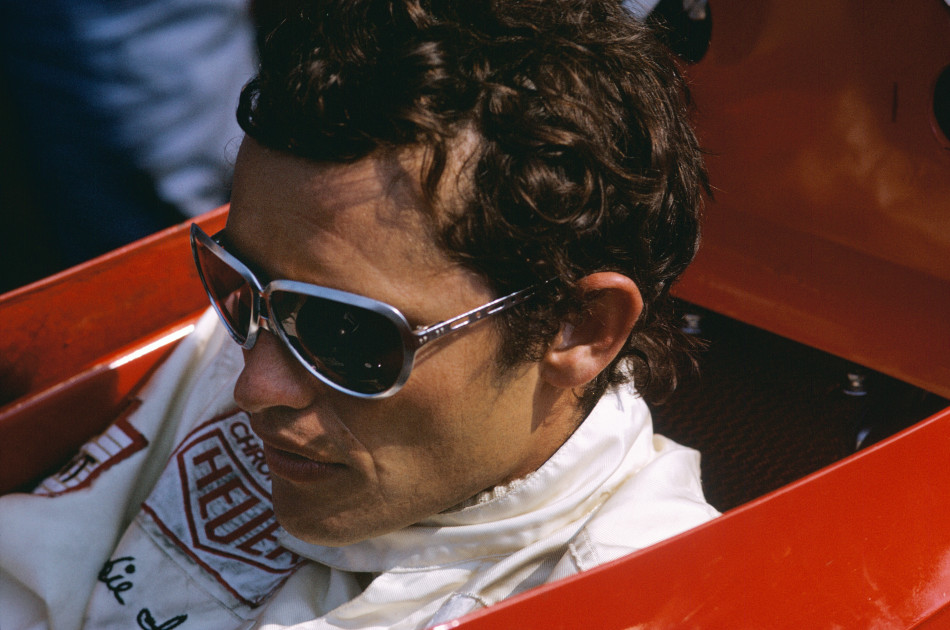Auto #16 - In a class of his own
In an era of great racing characters, Jacky Ickx stood out from the crowd – most famously at Le Mans where his protest at the start in 1969 changed the face of the race

The magnetic pull of a powerfully charismatic individual draws eyes across the lounge of a Turin business hotel. A compact, stylishly attired gentleman – groomed hair, assured manner – strides from the lift with measured, deliberate cadence. He’s precisely on time, knows the value of it. He’s in no hurry.
This is Jacky Ickx, unmistakeable despite this being a first meeting. And that walk… for 10 electrifying seconds at the start of the 1969 Le Mans 24 Hours, it said everything about Ickx.
That year he staged a calculated and very public protest against what he regarded as the insanity of the time-honoured Le Mans starting procedure, whereby drivers would sprint across the track to their cars, lined up opposite, and gun away, belts loose.
This being the era when moves to improve driver safety were gathering momentum, they were elsewhere required to be belted tight inside their cockpits. The power of Le Mans tradition exempted the race from that nicety, tempting every hot-shot to get the car started and moving first, then worry about belting in somewhere round the lap… most likely down the Mulsanne Straight… single-handed… surrounded by rivals jostling for track position… at more than 200mph. Crazy, thought Ickx, with 24 hours of racing ahead. He alone refused to sprint and strapped in good and proper before starting – dead last.
Perhaps it was inevitable that privateer John Woolfe would be killed on lap one of Le Mans ’69; his death – and Ickx’s iconoclastic protest – meant there would never be another ‘Le Mans’ start.
Still only 24, he had made his point: “The era then was dangerous and there were a lot of people dying in motor racing,” Ickx reflects. “It was clear that running to the car and starting without putting your seatbelt on, to be able to start as quickly as possible, was not a good idea. And also the fact that we were not supposed to be a real contender for the win helps you to have the idea of walking, to show that in 24 hours, starting first and last doesn’t change anything.”
But it so nearly did. Ickx and driving partner Jackie Oliver won in a Ford GT40, beating the Porsche 908 of Hans Hermann and Gérard Larrousse by just 110 metres – the closest finish in Le Mans history.
A few more seconds’ tightening belts at the start and they wouldn’t have won. “You see the story as you see it today,” Ickx posits. “Now imagine that I finished second by around 20 metres. That’s not at all the same story. You would be sitting here telling me it would’ve been wiser to start like the others. It was a very attractive start for the show, but it wasn’t a solution any more.”
Yet such strength of character to make that stand…
“When you are young you dare to do a lot of things that you wouldn’t do later on,” Ickx continues. “That’s the advantage of being young – you have no fear. And nobody knew anyhow, because I did not mention it to anyone.”
A PLACE IN HISTORY
The win was the first of six Le Mans victories for the man who would come to be known as ‘monsieur Le Mans’ and he remains closely associated with the majestic event. His ties allow an informed judgement of elite sportscar racing, which is booming now in the guise of the World Endurance Championship, as it did in the late 1960s and early ’70s. Ickx reckons it difficult to compare the two eras, however. “Endurance racing is like grand prix racing now,” he says, “flat out, non-stop. There was a time where you could lift off a little bit and be quiet, but today it is pure, pure, pure racing, because the game has changed so much. We used to have three cars in a truck and no motorhomes. There were no facilities, so we changed in the car. The mechanics cooked with ham from the trunk, spaghetti, cheese and a bottle of propane. We would all sit together in the truck, the paddock was just some grass in the middle… There was a lot of atmosphere and soul in it and the goalswere not the same as they are today.”
The ‘Ickx’ name sits somehow most comfortably with that turn-of-the-decade time, alongside Stewart and Rindt in Formula One; Bell, Vaccarella and Attwood in sports cars. And he’s happy to acknowledge the rich colour of a period forever framed in black-and-white: “Very often I’m presented as someone very eclectic in this sport,” he says, “but we were all like that in a way simply because there were no exclusive contracts. I was a year with Ferrari driving for Ford at the same time. We never had that kind of exclusivity and the power of the finance was not as important as it is today.”
And then a phrase to gladden the heart of anyone who has never loved motor racing: “Driving was the goal,” he asserts, “and when I’m saying that, I was not the only one – Jim Clark did it, Stewart, Brabham – all of us. We were racing in saloon cars and other categories. The competition now is so tough, to reach the few places where there is a pinnacle of racing drivers. It looks hard to me and that’s one of the reasons that you will never get the same sort of personalities, because today you can only do one thing at a time.”
Ickx’s “pinnacle”, in a baldly statistical sense, was his close run to the 1970 Formula One World Championship, with Ferrari – then, as now, a team like no other.
As history records, Jochen Rindt was crowned posthumous 1970 world champion having been that season’s form man, with five wins for Lotus, before a fatal accident in practice for the Italian GP. But Rindt’s death had left Ickx in second place with two grands prix remaining, opening the invidious opportunity of taking a dead man’s title, should he win both. Fourth place at the penultimate round, the US Grand Prix, cleared Ickx of that ghastly burden and freed him to race for the win at the season-closing Mexican GP, conscience clear.
Ickx describes himself as “lucky” not to have snatched the title from a deceased opponent: “It would have been dreadful to live all these years with a stolen trophy,” he says. “What a chance, what a chance… Jochen deserved it. You do not dream about beating someone who cannot be there to defend himself. It was well written this way. It wouldn’t have been normal to forget his accident and lift that trophy. I have no regrets. When I see all I have received through these years and to still be alive – you have no right to complain.”
His Ferrari years, spanning 1968-73 in sports cars and F1, he reckons “could have been more successful”, but he prefers to cherish scarlet memories, than dwell on regret: “When you have driven once for Ferrari, you have them forever – your heart is painted red,” he says. “It is a legend. And Enzo Ferrari… I think for me he had a special sentimentality or respect or whatever. I would love to say that he treated me how you would treat one of your children, in a way. I liked him and he liked me, but there were a lot of hidden sentimentalities in him that I understood later – he didn’t want to be too close to his drivers because when he started himself to compete it was really dangerous. He lost a lot of drivers and also friends. To avoid being in that sort of situation – knowing the danger and knowing the risk – he avoided expressing his tenderness to those who were driving for him, but I have plenty of nice memories of him and the people around him.”
FROM LE MANS TO DAKAR
There’s a strong sense with Ickx, 71, of calm perspective and he notes in passing that “sooner or later, someone will come along and beat you.” It’s as if the qualities that allowed him to make a stand, in his twenties, became further distilled as he progressed through a life that embraced peril, even as he rejected needless danger: “If you go motor racing you know what you are doing and it is an accepted risk. The deadly accidents used to hurt, of course, but it was something that we had accepted.”
Not blindly though. At the 1984 Monaco Grand Prix, Ickx was clerk of the course and made the bold call to stop the race amid a deluge, with 45 laps to run. There were accusations that Ickx, a Belgian, had acted to help race leader Alain Prost, a Frenchman, win on what was effectively home soil, as he was being closed down by Ayrton Senna.
Ickx draws parallels between his decision that day and his Le Mans ’69 defiance: “You know, safety cars did not exist then and I stopped the race because of the rain. You have to do what you feel is right, especially for survival against unnecessary accidents, because the goal for a driver is to survive and carry on doing what he likes to do. You have a duty to avoid accidents and that’s the situation of every referee or clerk of the course today – you have to take the right responsibilities and decisions.”
Half-points were awarded for the race, giving Prost just 4.5 – and he would lose that year’s title by half a point to team-mate Niki Lauda. “That’s just a detail,” Ickx insists. “The important part is that before, when we started a race in good conditions or in bad conditions, we had to finish and nobody took care. We admit to all of that now, but luckily we see those risks differently today. It was an open door for a new era, when the results and the points were secondary [to a driver’s safety].”
Aside from occasional race-officiating duties, Ickx was still pursuing a top-line professional racing career in the ’80s, as a factory Porsche driver, winning his sixth and final le Mans in 1982
and placing second in ’83. He raced on with Porsche into 1985, though his final circuit-racing season was scarred with tragedy. He and emerging German ace Stefan Bellof touched at Eau Rouge corner as they fought for the lead of the ’85 Spa 1000km race, causing Bellof to crash fatally.
At age 40 it was time for Ickx to take stock. He had enjoyed a vivid racing career, driving for several of motor sport’s greatest teams and conquering its most daunting machines and circuits, but the moment had come for this uncommonly reflective driver to take a view on how far he had travelled and what adventures might still lie ahead.
“When you are young,” he says, “you don’t care about your growth, because you want to climb up the mountain and you don’t care about the rest. You have one goal and you try to reach your goal and you want to be one of the best – or the best if possible – but you don’t pay attention to the people the same way that you would when you have done the larger part of the track that you’re on. In motor racing, you require qualities that are not really qualities in a normal life. That’s why very often you’ll say that the guy who is in the car is not the same one that you met in the restaurant two days before. In my opinion, they are two different personalities.”
At something of a personal crossroads, Ickx, still feeling the urge to compete, but yearning for something more, had become drawn to the beckoning vistas of the Paris-Dakar rally. He first entered in 1981, beginning a love affair with the event, which he won in ’83 and in which he would participate until 2000. This was more than racing for Ickx; the ‘Dakar’ was a spiritual journey into an endlessly fascinating continent and, even, into his very existence.
“It is,” he says quietly, measuring his words with great care, “the most extraordinary race. And it is also the most incredible opportunity to look around you, to see the other people around you, to see the continent and to see also how small you are and to see how unimportant you are on this planet. Of course it changes your views on life and it gives you a chance to pay attention to those who are around you.
“Clearly,” he continues, “you may say that I have been quite successful in motor racing, but you have to keep in mind that we are the result of a group of people in motor racing who have a project and all of them together give you a car. So probably the most interesting aspect of it all has come at an age when the distance ahead is not so far – that is, the intellectual part where you discover you are not alone on the planet. We are what we are because we are surrounded by people who change your life.” This most generous conclusion, after a lifetime’s pursuit of the most singular goals.
Click here to read Auto #16 Magazine online.

 Facebook
Facebook Twitter
Twitter






